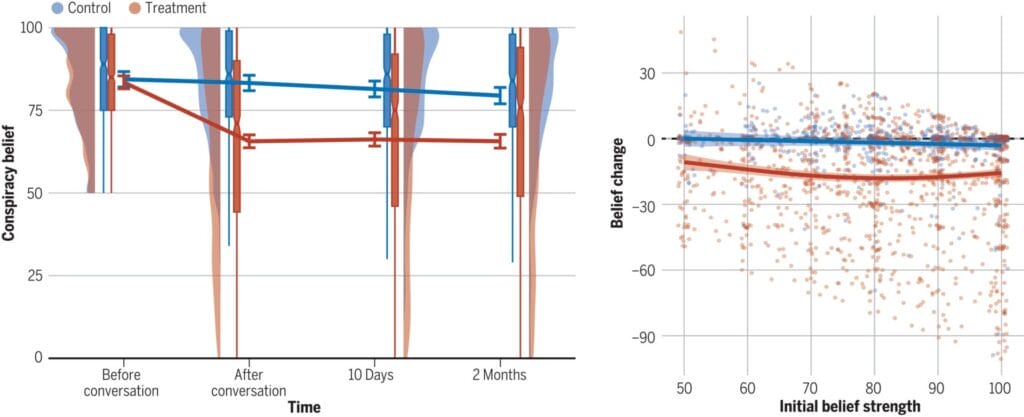A team of scientists are looking to dissuade people from believing “conspiracy theories” by using artificial intelligence through constant dialogue and manipulation. These so-called conspiracy theorists and their beliefs are referred to as “threats to democracy,” and the results of their experiments appear to demonstrate that AI could be an effective way to brainwash these individuals into no longer holding these beliefs.
Published in the journal Science on September 13th, the study is titled “Durably reducing conspiracy beliefs through dialogues with AI.”
According to the authors, they “investigated whether dialogs with a generative artificial intelligence (AI) interface could convince people to abandon their conspiratorial beliefs. Human participants described a conspiracy theory that they subscribed to, and the AI then engaged in persuasive arguments with them that refuted their beliefs with evidence.” Based on their findings, AI over the course of months was able to whittle down the held beliefs of some of the participants.
The structured abstract and results of the study read:
INTRODUCTION
Widespread belief in unsubstantiated conspiracy theories is a major source of public concern and a focus of scholarly research. Despite often being quite implausible, many such conspiracies are widely believed. Prominent psychological theories propose that many people want to adopt conspiracy theories (to satisfy underlying psychic “needs” or motivations), and thus, believers cannot be convinced to abandon these unfounded and implausible beliefs using facts and counterevidence. Here, we question this conventional wisdom and ask whether it may be possible to talk people out of the conspiratorial “rabbit hole” with sufficiently compelling evidence.
RATIONALE
We hypothesized that interventions based on factual, corrective information may seem ineffective simply because they lack sufficient depth and personalization. To test this hypothesis, we leveraged advancements in large language models (LLMs), a form of artificial intelligence (AI) that has access to vast amounts of information and the ability to generate bespoke arguments. LLMs can thereby directly refute particular evidence each individual cites as supporting their conspiratorial beliefs.
To do so, we developed a pipeline for conducting behavioral science research using real-time, personalized interactions between research subjects and AI. Across two experiments, 2190 Americans articulated—in their own words—a conspiracy theory in which they believe, along with the evidence they think supports this theory. They then engaged in a three-round conversation with the LLM GPT-4 Turbo, which we prompted to respond to this specific evidence while trying to reduce participants’ belief in the conspiracy theory (or, as a control condition, to converse with the AI about an unrelated topic).
RESULTS
The treatment reduced participants’ belief in their chosen conspiracy theory by 20% on average. This effect persisted undiminished for at least 2 months; was consistently observed across a wide range of conspiracy theories, from classic conspiracies involving the assassination of John F. Kennedy, aliens, and the illuminati, to those pertaining to topical events such as COVID-19 and the 2020 US presidential election; and occurred even for participants whose conspiracy beliefs were deeply entrenched and important to their identities. Notably, the AI did not reduce belief in true conspiracies.
Furthermore, when a professional fact-checker evaluated a sample of 128 claims made by the AI, 99.2% were true, 0.8% were misleading, and none were false. The debunking also spilled over to reduce beliefs in unrelated conspiracies, indicating a general decrease in conspiratorial worldview, and increased intentions to rebut other conspiracy believers.
CONCLUSION
Many people who strongly believe in seemingly fact-resistant conspiratorial beliefs can change their minds when presented with compelling evidence. From a theoretical perspective, this paints a surprisingly optimistic picture of human reasoning: Conspiratorial rabbit holes may indeed have an exit. Psychological needs and motivations do not inherently blind conspiracists to evidence—it simply takes the right evidence to reach them. Practically, by demonstrating the persuasive power of LLMs, our findings emphasize both the potential positive impacts of generative AI when deployed responsibly and the pressing importance of minimizing opportunities for this technology to be used irresponsibly.

The authors’ personal bias bled through in their study, however, eventually equating and replacing the phrase ‘conspiracy theory’ with ‘bull****.’ They wrote:
“Our findings fundamentally challenge the view that evidence and arguments are of little use once someone has “gone down the rabbit hole” and come to believe a conspiracy theory. They also call into question social-psychological theories that center psychological “needs” and motivations as primary drivers of conspiratorial belief.
“Instead, our results align more closely with an alternative theoretical perspective that posits a central role for analytic thinking in protecting against epistemically suspect beliefs and behaviors, such as superstitions and paranormal beliefs, misinformation, and pseudo-profound bull****.”
The authors also concluded that their research could have other practical applications, explaining how pre-generated AI responses to certain internet queries could be used manipulate the user’s preconceived notions. They authors wrote:
Most broadly—in contrast to notions of a “post-truth” world in which facts no longer matter—arguments and evidence should not be abandoned by those seeking to reduce belief in dubious conspiracy theories.
More specifically, AI models are powerful, flexible tools for reducing epistemically suspect beliefs and have the potential to be deployed to provide accurate information at scale. For example, internet search terms related to conspiracies could be met with AI-generated summaries of accurate information—tailored to the precise search—that solicit the user’s response and engagement.
Similarly, AI-powered social media accounts could reply to users who share inaccurate conspiracy-related content (providing corrective information for the potential benefit of both the poster and observers).
AUTHOR COMMENTARY
There is a word for these types of people who conducted this ridiculous: libtard.
Job 6:25 How forcible are right words! but what doth your arguing reprove? [26] Do ye imagine to reprove words, and the speeches of one that is desperate, which are as wind?
The sheer lack of professionalism just goes to demonstrate how delusional and warped these people are; but their research creates a new precedent to further leverage AI to manipulate the minds of the masses. This is essentially what Google and the United Nations have started doing called “pre-bunking.”
SEE: Google Launches “Prebunking” Campaign In Europe To Stop Spread Of Fake News And Disinformation
UN Official Advocates For ‘Digital Integrity Code’ To Tackle ‘Health Misinformation’
Google Launches ‘Pre-Bunking’ Anti-Misinformation Campaign Ahead Of EU Elections
Being the “conspiracy theorist” that I am (which in my case should more accurately be referred to as “pattern recognitionist” and discerning), how much longer before the “conspiracy theorists” are hauled-off to the funny farm to be “reeducated” and AI is used on the inmates to brainwash them?
[7] Who goeth a warfare any time at his own charges? who planteth a vineyard, and eateth not of the fruit thereof? or who feedeth a flock, and eateth not of the milk of the flock? [8] Say I these things as a man? or saith not the law the same also? [9] For it is written in the law of Moses, Thou shalt not muzzle the mouth of the ox that treadeth out the corn. Doth God take care for oxen? [10] Or saith he it altogether for our sakes? For our sakes, no doubt, this is written: that he that ploweth should plow in hope; and that he that thresheth in hope should be partaker of his hope. (1 Corinthians 9:7-10).
The WinePress needs your support! If God has laid it on your heart to want to contribute, please prayerfully consider donating to this ministry. If you cannot gift a monetary donation, then please donate your fervent prayers to keep this ministry going! Thank you and may God bless you.








Honestly at this point I’ve come to the conclusion that it’s just about time to abandon the internet aside from weather reports, downloads, and necessary orders.
Yeah, we’re basically at that point.
“Prominent psychological theories propose that many people want to adopt conspiracy theories (to satisfy underlying psychic “needs” or motivations), and thus, believers cannot be convinced to abandon these unfounded and implausible beliefs using facts and counterevidence.”
What a load of horse dung. Inspired by a drug-addict looney:
“According to Sigmund Freud’s psychoanalytic theory of personality, the id is the personality component made up of unconscious psychic energy that works to satisfy basic urges, needs, and desires.”
Truth is rough on the flesh, even for saved people sometimes (and for those who don’t study the Bible, even more so). What did Jonah do again, run away from the Lord and his word?
So it’s a complete lie to say that conspiracy theories (most probably—wait,no…I’d say definitely the King James Bible, salvation, the political circus, vaccines, etc. are what they’re referring to) are adopted for satisfaction. Basic urges and needs cater to the flesh which is a powerful enemy, and the flesh would rather live in ignorant bliss; desires will too, unless it’s related to pleasing the Lord. Adopting truth takes a lot of mettle, it’s almost impossible for almost all lost people; hence, the “red pill”.
If it’s the absolute truth which is the word of God, impossible without the Holy Spirit in you.
“We hypothesized that interventions based on factual, corrective information may seem ineffective simply because they lack sufficient depth and personalization. To test this hypothesis, we leveraged advancements in large language models (LLMs), a form of artificial intelligence (AI) that has access to vast amounts of information and the ability to generate bespoke arguments. LLMs can thereby directly refute particular evidence each individual cites as supporting their conspiratorial beliefs.”
Person-to-person interventions? Or the typical Google search data, which is personalized already as it is, like a prison, echo chamber. If it’s the former, then they must be too lazy to read up, study and structure how they’ll be presenting the “facts” on a face to face basis. If online, studious people are becoming more aware that there are other search engines out there for gathering and cross-checking info; in addition, social media platforms, both independent and corporate-run like Rumble, Brighteon, X and others. So out of slothfulness, “Let’s just dump all the work on a glorified automaton. Yes, good idea!”
This might work on lost people; and to be blunt out of love, lazy Christians who don’t fill their heads with scriptures, remove distractions like TVs, secular music, excessive life’s affairs, and don’t study other things (none of us are perfect, we all mess up, I get it. ). But this won’t work on saved brethren who constantly abide in the King James Bible and are always putting the flesh under subjection. Though, I’m not saying we are utterly invulnerable to being vexed and drained by this; tag-teamed with the PC’s screens and worse, the wireless devices’ horrible physiological effects. Reason why unplugging from the internet regularly, and throwing away your cancer tablets and cell phones for good is a must, and when the internet finally becomes unusable for us, then good. We’ll find other ways with God’s help.
Blah, blah, blah, intellect double speak! Boo hoo hoo, are feelings might get hurt and we decide what is “safe for all”
My beliefs will NOT be changed by those blowhards or A I.
God shows me the real truth whether they like it or not